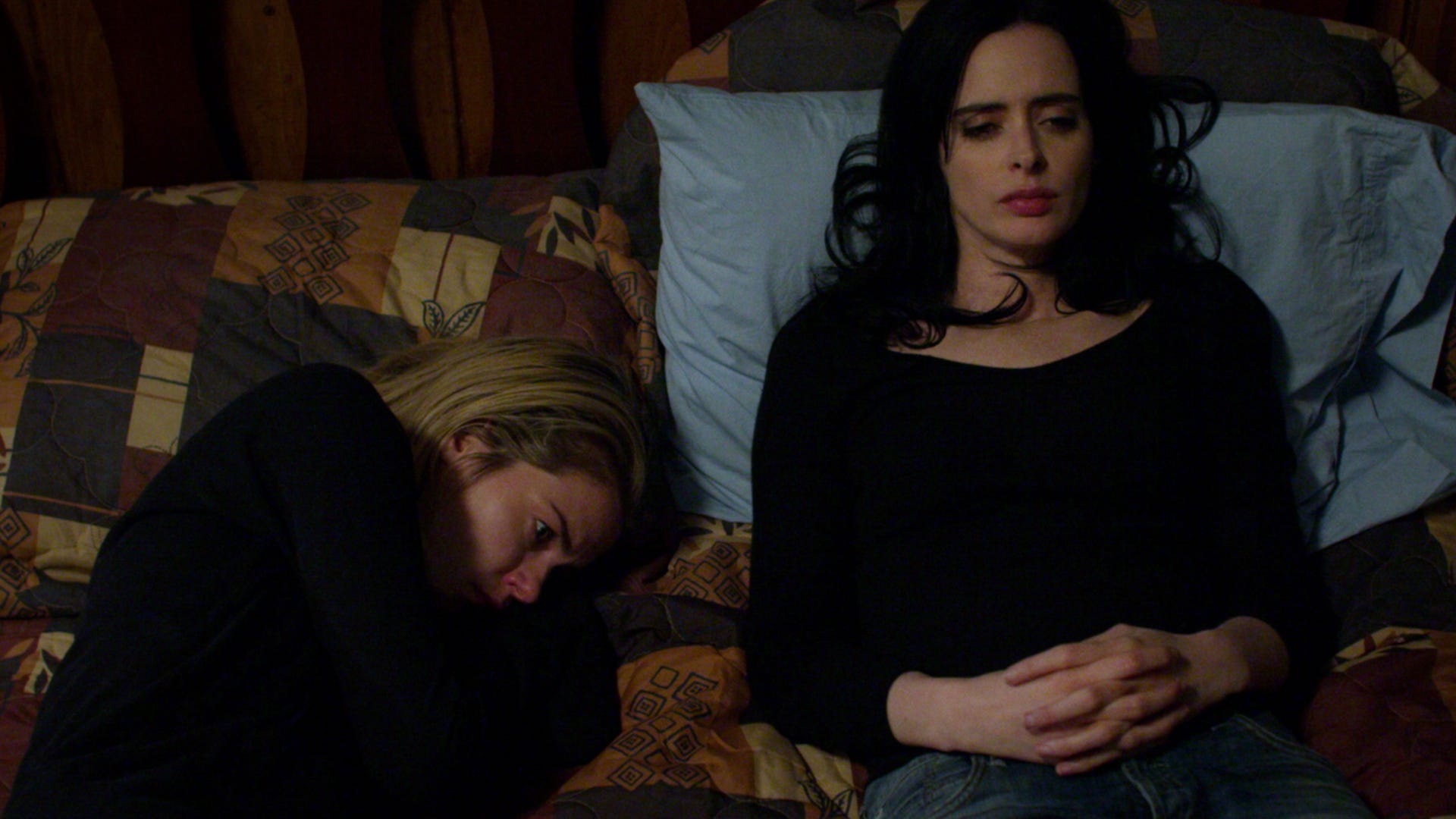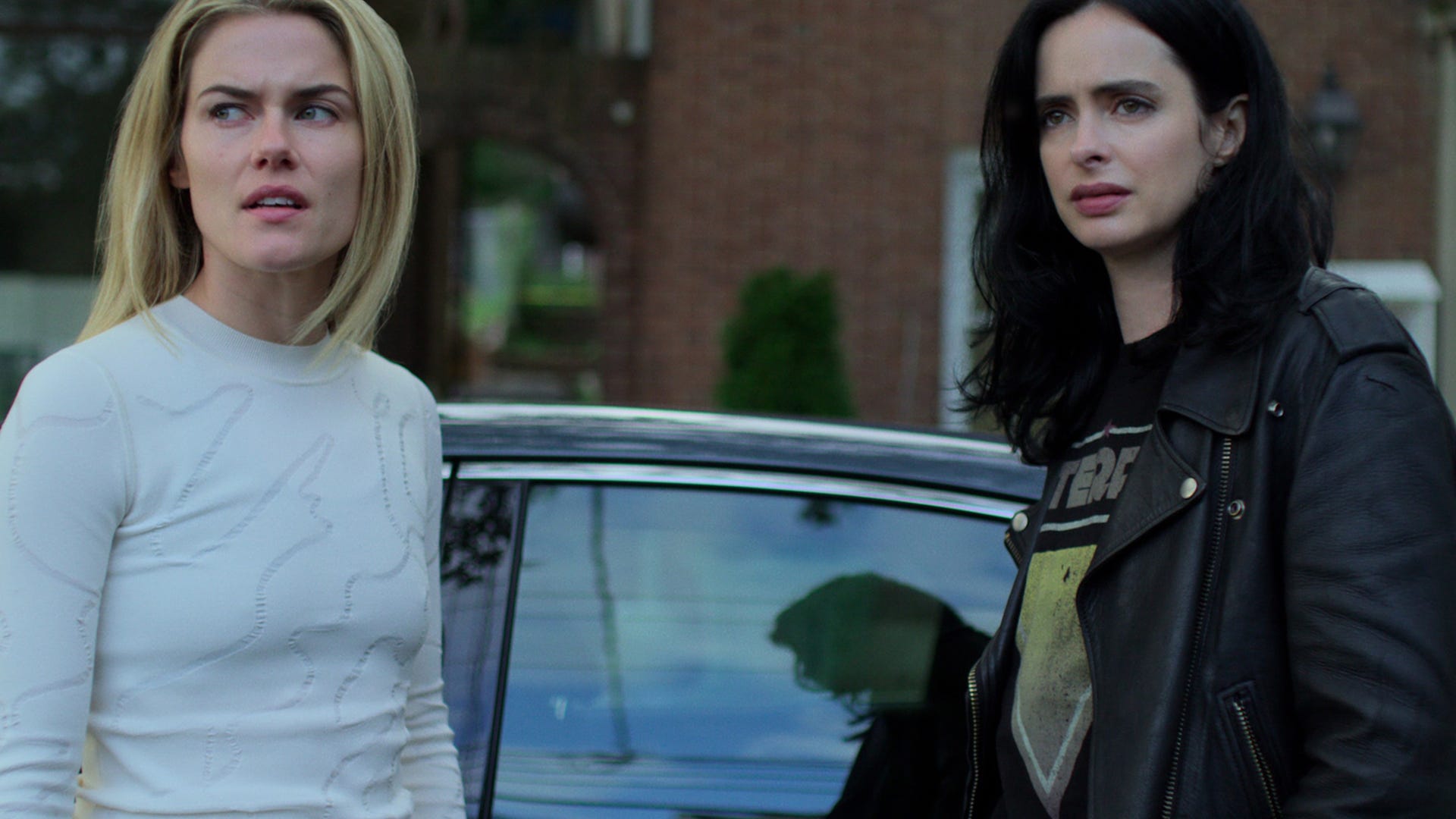Join or Sign In
Sign in to customize your TV listings
By joining TV Guide, you agree to our Terms of Use and acknowledge the data practices in our Privacy Policy.
The Worst Casualty of Jessica Jones' Final Season Was the Show's Female Friendship
This was hugely disappointing
[This story contains spoilers from Season 3 of Marvel's Jessica Jones.]
When Jessica Jones dropped on Netflix back in 2015, the series was unique for a few reasons. For starters, it focused on a female character in the Marvel Universe (joining the gone-too-soonAgent Carter, which premiered that same year on ABC), and it portrayed her as gritty, apathetic, and angry as she slowly came around to accepting her role as a hero. This was rare, and it's still rare today, as no other Marvel character -- of any gender -- has been able to match Jessica's (Krysten Ritter) detached-yet-caring front.
And the show did something else differently: Instead of giving Jessica a romantic lead to chase after, it gave her a best friend to confide in and lean on. Though Jessica and Patsy "Trish" Walker (Rachael Taylor), her foster sister, were estranged at the beginning of the series, they managed to put the past behind them and work together toward the common goal of stopping evil throughout Hell's Kitchen.
The first season of Jessica Jones is a superhero show, but it's also very much a story about female friendship. Men -- like Luke Cage (Mike Colter), Kilgrave (David Tennant), and Will Simpson (Wil Traval) -- come and go in both of their lives, but the one constant is the fact that Jessica and Trish have each other. Season 1 ends with Jessica declaring her love for Trish moments before she kills the bad guy. At the start of Season 2 it felt like they could take on the world together.
But then Jessica Jones fractured Jessica and Trish's relationship in irreparable ways. Sure, we've all been through rough times with friends, but the rift between these two in Season 2 was different. Trish became jealous of Jessica's superpowers (a feeling that has been lingering all along) and lashed out at her, even going so far as to kill Jessica's long-lost mother because she felt she was a threat. By Jessica Jones' third season, which was also its last, the show had disregarded everything about the strong (if complicated) female friendship at its core, reducing these two women to petty catfights (literally!) and mean-girl behavior that came out of nowhere. In the beginning, Jessica Jones showed us that women are stronger when they work together; Season 3 of the series completely forgets this idea.

Krysten Ritter and Rachael Taylor in Marvel's Jessica Jones
Courtesy of NetflixTrish is, essentially, the villain of Jessica Jones Season 3, which is an odd narrative choice. She's so consumed by her desire to become a superhero and fight for justice that she loses herself in her new persona as her comic counterpart, Hellcat. She starts off as just another vigilante running through Hell's Kitchen, but after her mother is brutally murdered by the season's bad guy, Gregory Salinger (Jeremy Bobb), Trish completely goes off the rails, becoming a cliche of an angry woman. Unlike plenty of other angry women in Marvel canon -- like Scarlet Witch, who channels her energy toward defeating Thanos, or Black Widow, who has learned to live with ongoing troubles -- Trish suddenly has no other personality trait outside her anger.
Jessica, meanwhile, keeps trying to be Trish's friend. Though it's never really discussed at length, Jessica eventually comes around to forgiving Trish for killing her mom because it's clear Trish needs someone in her life, and that person is Jessica. Trish supported her through some dark days, and in the third season, Jessica is returning the favor. But after a while, it's hard not to wonder why. Trish is downright awful in Season 3. She's hellbent on seeking revenge for the murder of her mother; the anger and grief is all-consuming. This is exactly why Trish needs a support system -- but she keeps pushing away the one person trying to help.
This, obviously, pits Jessica and Trish against one another. This, obviously, means that one of these women is going to win and the other is going to lose. It's not hard to figure out which one will win. In the end, Jessica and Trish actually fight it out after Trish kills Salinger, and Trish is ready to kill Jessica to escape. She goes so far as to stab her foster sister and best friend, though Jessica stops her with her bare hands, which take most of the damage.
Jessica lets Trish get taken away to pay for her crimes, and the last time the two see each other, probably forever, Trish is being loaded onto a helicopter for the Raft. At the beginning of this journey, Trish was the sensible one with her head on straight; she was the level-headed, grounding force Jessica needed to become the hero she is now. In the end, she's tied up in chains surrounded by armed guards, having finally hit the ground after her fall from grace.
Season 3 of Jessica Jones sacrificed what was once one of TV's most interesting and real female friendships. Sometimes friendships can't be mended, yes, but it was frustrating to watch the show turn Trish into a villain with a vendetta against everyone, including her foster sister, for seemingly no reason but to move the plot forward. The first season of Jessica Jones showed you can't go through life all alone without someone there, which Jessica had to learn herself -- thanks to Trish. On a show that started out dedicated to taking down male abusers, it mattered that a female friendship was key to Jessica's growth.
Instead, the series concludes with Jessica all alone, without the person who helped her realize she couldn't do everything alone. It's enough to make us wonder why we ever rooted for Jessica and Trish to take on the world together in the first place.

Rachael Taylor and Krysten Ritter, Jessica Jones
Courtesy of Netflix